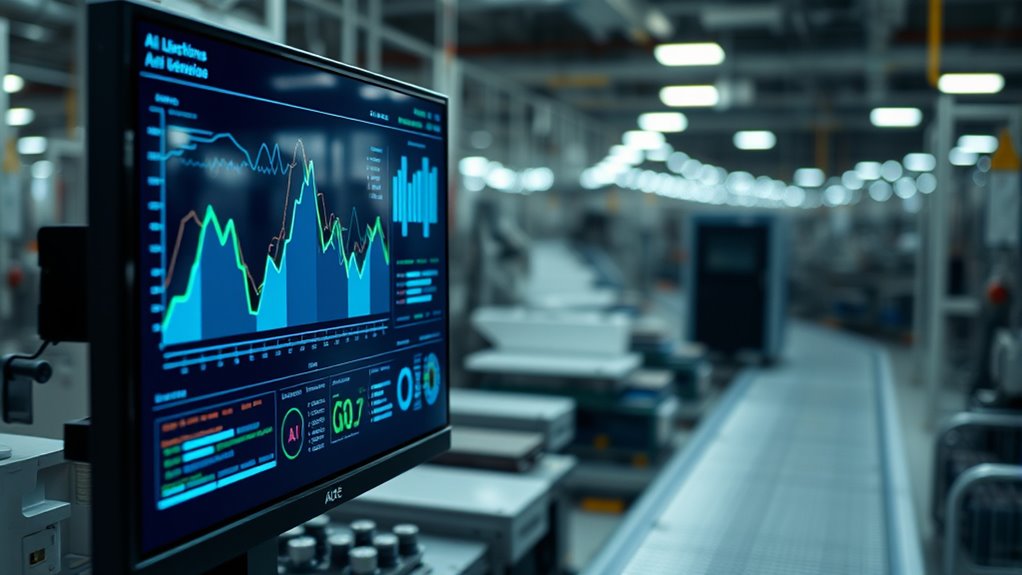Without human oversight, AI in CPG risks losing consumer trust due to biased recommendations, privacy breaches, and opaque decision-making. You may face issues like poor product suggestions and regulatory violations that damage your brand’s reputation. Automated decisions without human validation can feel cold or disconnected, making customers hesitant to trust your brands. If you’re interested in understanding how human oversight can safeguard your AI efforts and maintain trust, keep exploring these strategies.
Key Takeaways
- AI without human oversight risks producing biased recommendations and mishandling sensitive data, undermining consumer trust.
- Lack of human validation can lead to regulatory violations and operational risks, damaging brand reputation.
- Automated decisions made without human review often appear cold or disconnected, reducing customer confidence.
- Without human intervention, AI systems may fail to detect biases or errors, resulting in poor user experiences.
- Proper human oversight ensures accountability, enhances AI fairness, and maintains consumer trust in CPG brands.

AI has the potential to transform consumer packaged goods (CPG), but without human-in-the-loop oversight, it risks eroding trust and damaging brand reputation. When AI systems operate without human supervision, they can produce biased product recommendations or mishandle sensitive data, leading to lost customer confidence and potential legal issues. Consumers often don’t understand how AI makes decisions, especially when brands fail to clearly explain the process, which fuels suspicion and skepticism. Transparency is essential; yet, many AI tools lack clear explanations for their actions, making shoppers wary of how their personal information is used. This distrust is further fueled by poor AI experiences—such as inaccurate recommendations or opaque operations—that cause nearly 39% of shoppers to abandon their purchases altogether. If consumers feel they’re not in control or don’t understand why choices are made, they’ll turn away from the brand.
Without human oversight, AI risks eroding trust and damaging brand reputation in CPG.
Human oversight plays an indispensable role in maintaining trust. When humans review AI outputs, they can spot biases or errors early, preventing negative impacts on customers. Including human experts ensures accountability and ethical compliance, especially under strict CPG regulations. It also helps make AI decisions more explainable; by validating AI-driven recommendations, brands can clarify how conclusions are reached, increasing consumer confidence. Continuous human-in-the-loop monitoring allows for root cause analysis when AI fails, improving reliability in areas like supply chain management and inventory planning. Without human input, AI may lack the context needed to make nuanced judgments, resulting in automated decisions that seem cold or disconnected—damaging trust and perceived quality.
Consumers increasingly expect AI to enhance product quality and sustainability efforts. Studies show that 96% of those who buy AI-enhanced products are satisfied, with 40% rating their satisfaction as very high. Most shoppers also want brands to leverage AI for better sustainability and innovation. But they only reward transparency and clear added value; if AI benefits are unclear or don’t lead to tangible improvements, trust erodes. Misused AI can also create operational risks—faulty demand forecasts, biased segmentation, or privacy leaks—that threaten regulatory compliance and brand integrity. Without proper oversight, AI-driven automation, like purchase recommendations, faces resistance—66% of consumers would reject AI-made decisions, even if they offer better deals. Over-reliance on AI can also harm customer service, leading to dissatisfaction when AI tools fail to address individual needs.
AI tools can help guarantee compliance by generating audit trails and tracking regulatory updates, but only if managed carefully with human oversight. Failing to implement proper governance and continuous review risks regulatory violations, such as those posed by emerging laws like the EU AI Act. Ultimately, without human-in-the-loop involvement, AI in CPG risks becoming a trust-breaking force rather than a value-adding asset. It’s essential to embed human oversight into AI strategies to safeguard consumer confidence, uphold brand reputation, and ensure AI’s responsible and effective deployment. Furthermore, integrating color accuracy in AI-generated product recommendations can enhance customer satisfaction and trust in the technology.
Frequently Asked Questions
How Does Human Oversight Improve AI Decision-Making in CPG?
Human oversight improves AI decision-making in CPG by validating and correcting predictions, ensuring accuracy and reliability. You can review AI outputs in context, reducing errors caused by data anomalies or model limitations. Your active monitoring helps spot biases and unexpected behaviors, aligning decisions with business goals. Additionally, your feedback refines AI models over time, boosting their responsiveness to market changes and maintaining trust through transparency and ethical compliance.
What Are Common Consequences of Neglecting Human-In-The-Loop?
Neglecting human-in-the-loop is like sailing without a sailor—you risk running aground. You’ll face reduced accuracy as machines misclassify data, and bias may go unchecked, causing unfair outcomes. Transparency suffers because you can’t verify decisions, and responsiveness drops as models struggle with new or complex situations. Without human oversight, trust erodes, and your AI system becomes unreliable, ultimately damaging your reputation and stakeholder confidence.
Can AI Algorithms in CPG Be Biased Without Human Intervention?
Yes, AI algorithms in CPG can be biased without human intervention. You risk inheriting biases from historical data, especially if it’s unrepresentative or incomplete. Automated processes might overlook subtle biases or reinforce existing stereotypes, leading to unfair consumer insights and decisions. Without human oversight, these biases go unchecked, which can damage your brand’s reputation, mislead marketing efforts, and erode consumer trust over time.
How Do Consumers Perceive Ai-Driven CPG Products?
You see consumers generally respond positively to AI-driven CPG products, especially when they experience personalized content and real-time support. They trust brands more when AI feels responsive and accurate, with many engaging more deeply with tailored recommendations. However, some remain cautious about AI without human oversight, fearing inaccuracies or lack of transparency. To build trust, you need to guarantee AI is reliable, transparent, and complemented by human touchpoints when necessary.
What Best Practices Ensure Effective Human-Ai Collaboration in CPG?
Think of human-AI collaboration as a skilled conductor leading an orchestra. To guarantee harmony, you set clear roles, foster open communication, and encourage continuous learning. You involve humans in decision-making, verify AI insights, and remain adaptable to new melodies. By blending human judgment with AI’s precision, you create a symphony of innovation and trust, delivering products that resonate deeply with consumers and strengthen your brand’s reputation in the CPG space.
Conclusion
Without a human-in-the-loop, AI in CPG is like a robot trying to sell ice to penguins—utterly out of place and untrustworthy. You might think the machine’s got it all figured out, but without human judgment, it’s more like a parrot mimicking sales pitches than a trusted advisor. So, next time you rely solely on AI, remember: even the smartest algorithms need a human touch to avoid turning trust into a sinking ship.










